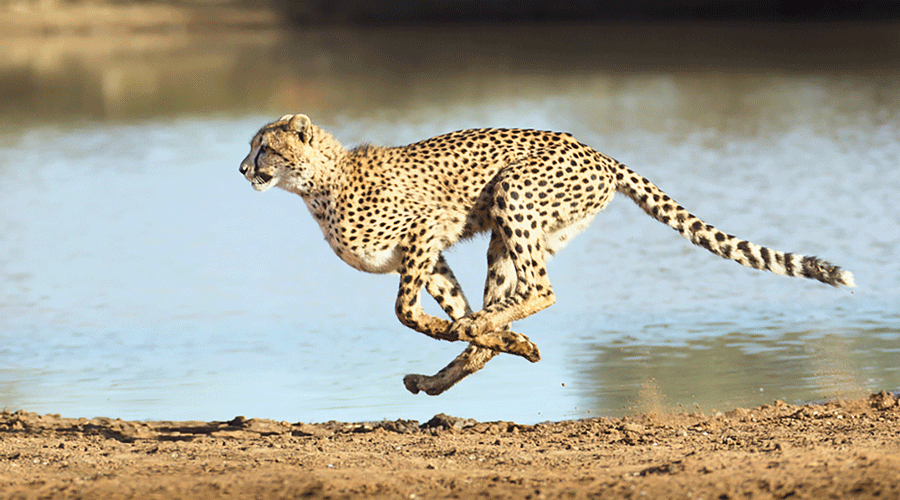India’s environment ministry is hoping to release cheetahs from South Africa into the Kuno-Palpur National Park in Madhya Pradesh by August, but proposals from wildlife biologists and a 2013 Supreme Court directive to shift some lions from Gujarat to Kuno-Palpur remain unimplemented.
The ministry’s plan to introduce 8 to 10 cheetahs every year over the next five years is part of an objective to reintroduce into India the only large carnivore that has gone extinct since the country’s independence. The cheetah was declared extinct in India in 1952.
An environment ministry official said on Tuesday that a 10 sq-km enclosure for cheetahs had been prepared at the Kuno-Palpur National Park where at least six cheetahs would be brought from South Africa, the Press Trust of India reported.
“The agreement with South Africa is in place and is being vetted by the legal cell,” the official was quoted by PTI as saying. “We plan to introduce 8 to 10 cheetahs every year and take the number to 50 over a five-year period.” A team from South Africa will visit Kuno next week to examine the arrangements.
The environment ministry and wildlife experts had initiated discussions to reintroduce the cheetah into India in 2009 and, the ministry said, Kuno-Palpur is the most promising among the 10 sites surveyed across Gujarat, Rajasthan, Madhya Pradesh and Chhattisgarh.
The 748 sq-km Kuno-Palpur park is devoid of human settlements, has adequate prey, forms part of an open forest landscape and has the capacity to sustain 21 cheetahs, the ministry had said earlier this year. Kuno is the only wildlife site in the country from where, all villages have been relocated.
But sections of wildlife biologists say those relocations and other measures in Kuno-Palpur were originally intended for lions from the Gir forest in Gujarat — and not for cheetahs from Africa.
Although the Gir lion population has grown from below 50 to over 500 by 2015, wildlife experts have long been worried about the future of the Asiatic lions because they are all present in a single site.
Such a population distribution makes them vulnerable to infections. In 2018, the Indian Council of Medical Research had confirmed that at least 21 lions had died from canine distemper virus, a deadly virus that had wiped out nearly a third of African lions in Tanzania’s Serengeti National Park in 1994.
“Not translocating lions from Gir to Kuno has been a direct breach of the 2013 Supreme Court order,” said Ravi Chellam, a wildlife biologist who specialises in lion conservation and is among experts who have long advocated for a second free-ranging population of wild Asiatic lions.
Chellam is chief executive officer of Metastring Foundation and coordinator of the Biodiversity Collaborative, a network of institutions working to promote biodiversity science and its links to human well-being in India.
The Supreme Court, in response to a petition by environmental groups, had in April 2013 directed the environment ministry to “take urgent steps” to move lions from Gir to Kuno. The Court had added that the order should be carried out “within six months.”
The Court, noting the environment ministry’s plan to introduce African cheetahs first into Kuno and then Asiatic lions, had described the plan as arbitrary, illegal and a violation of statutory requirements under the Wildlife Protection Act.
Wildlife experts say the plan to translocate the lions from the Gir forest has failed to progress because of resistance from Gujarat that the Centre has been unable to overcome. The Gujarat counsel had told the Court during the 2013 hearing that there is “no necessity” of finding a second home for the lions since the state has properly protected them in Gir and surrounding sanctuaries.
After the Court order, Chellam said, the National Tiger Conservation Authority, a unit of the environment ministry, filed an affidavit asserting that the introduction of cheetahs in Kuno would not adversely impact the proposals to translocate lions there.
“For now, there is no indication that the Gujarat government is willing to comply with the Supreme Court order,” said Chellam, who was a member of an expert panel appointed by the Supreme Court in 2013 to guide the translocation of the lions. “The introduction of cheetahs will only delay what should have been done years ago.”











